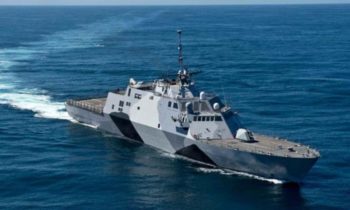
The U.S. Navy has found $500 million to buy a second Littoral Combat Ship in next year’s budget after scrounging that was required because the vessel was left out of the Trump administration’s proposed budget sent to Congress last month.
About $325 million will be freed up because the Navy has delayed the overhaul of an aircraft carrier that involves refueling its two nuclear power cores, according to officials who asked not to be identified before the White House will send the proposed budget amendment to Congress as soon as this week. An additional $100 million will be shifted from the Navy’s Infrared Search and Track program for installation on its F/A-18E/F fighters, and the rest from smaller programs.
The Littoral Combat Ship, designed for missions in shallow coastal waters, has been criticized by the Pentagon’s testing office, the Government Accountability Office and internal Navy studies that have questioned its costs, small crew and potential vulnerability in combat. But it retains Navy support, and it would help President Donald Trump reach his pledge for a 350-ship Navy, up from today’s fleet of 275 vessels that can be deployed.
Lawmakers added a third ship for the current year and are likely to back buying two in fiscal 2018 because that would guarantee shipyard work on both versions of the Littoral Combat Ship. One is built by Lockheed Martin Corp. in Wisconsin and the other by Austal Ltd. in Alabama.
The budget that Trump sent to Congress included the Navy’s request for $636 million to buy one vessel. The White House Office of Management and Budget informed service officials after the submission that it would support a second vessel and asked the Navy to find funding for it.
The Navy is delaying an overhaul on the USS John C. Stennis by about 10 months, “which would apparently shift the need for this funding from fiscal 2018 to fiscal 2019,” Ron O’Rourke, the naval analyst for the nonpartisan Congressional Research Service, said in an email.
The Senate Armed Services Committee’s seapower panel has scheduled a hearing on Navy shipbuilding on Wednesday, where the Littoral Combat Ship plans are expected to be discussed. In addition, the House Armed Services Committee plans to start formal work this week on its version of the fiscal 2018 defense policy bill.
“The printed budget request included one LCS because the facts and need for a second came to us so late in the process,” Meghan Burris, an OMB spokeswoman, said last month in explaining why a second ship wasn’t included. “We understand that Congress is moving quickly to put together FY18 bills, and wanted to get the change in front of them as quickly as possible.”
Lieutenant Kara Yingling, a Navy spokeswoman, said the Navy wouldn’t comment on the new funding arrangements until the proposal is submitted to lawmakers.
The Navy has said it’s important to maintain the workforces of both Lockheed and Austal until it’s ready to pick one of the contractors in mid-2020 to build a better-armed frigate as the successor to the planned fleet of as many as 30 Littoral Combat Ships.
Even as the White House adds another Littoral Combat Ship, the GAO reported in an April assessment that “deliveries of almost all LCS under contract at both shipyards have been delayed several months, and in some cases close to a year or longer.”
“Delays that have occurred for previously funded ships have resulted in a construction workload that extends into fiscal year 2020,” the GAO said.